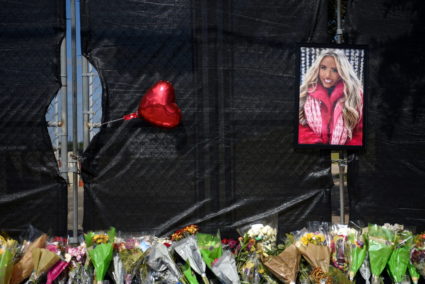
A federal panel reviewing President Donald Trump's plans to build a ballroom at the White House has set April 2…

HOUSTON — Authorities on Monday released the names of the eight people who died at a Houston music festival, as investigators watched video, interviewed witnesses and reviewed procedures to try to determine what went wrong when the crowd rushed the stage during a performance by the rapper Travis Scott.
Hundreds more were injured when the tragedy unfolded at the sold-out Astroworld festival Friday night. Some 50,000 people attended the event.
READ MORE: Aspiring border agent, dancer, engineer identified among Astroworld concert dead
Medical examiners have still not released the causes of death, which could take several weeks, said Michele Arnold, a spokeswoman with the Harris County Institute of Forensic Sciences.
"It's not the crowd's fault at all, because there was no way you could even move, it was just like a mass loss of control," said Ben Castro, 19. He returned to the venue Monday to leave flowers at a makeshift memorial that included notes, T-shirts and and candles. He said he didn't know anyone had died until the next day.
The dead were between the ages of 14 and 27 and were from Texas, Illinois and Washington, according to Harris County authorities. They included high schoolers, an aspiring Border Patrol agent and a computer science student.
Investigators planned to examine the design of safety barriers and the use of crowd control at the event that Scott founded. Over 300 people were treated at a field hospital on site and at least 13 people remained hospitalized on Sunday.
Houston police and fire department investigators said they would review video taken by concert promoter Live Nation, as well as dozens of clips from people at the show. Investigators also planned to speak with Live Nation representatives, Scott and concertgoers.
More than a dozen lawsuits had been filed as of Monday, and Live Nation announced it was delaying ticket sales for a Billy Joel concert at a different venue in Houston. The promoter said Monday it was assisting authorities so "the fans who attended and their families can get the answers they want and deserve."
Contemporary Services Corp., headquartered in Los Angeles, was responsible for security staff at the festival, according to county records in Texas. Representatives for the company — which advertises online as being "recognized worldwide as the pioneer, expert and only employee owned company in the crowd management field" — have not responded to emails and phone messages seeking comment.
Astroworld's organizers had laid out security and emergency medical response protocols in festival plans filed with Harris County. A 56-page operations plan, obtained by The Associated Press, describes "the potential for multiple alcohol/drug related incidents, possible evacuation needs, and the ever-present threat of a mass casualty situation are identified as key concerns."
The plan instructs staff to "notify Event Control of a suspected deceased victim utilizing the code 'Smurf'." It goes on to say, "never use the term 'dead' or 'deceased' over the radio." It's not clear whether the protocol was followed.
None of the people listed in charge of managing Astroworld's security and operations have responded to requests for comment.
Steven Adelman, vice president of the industry group Event Safety Alliance — which was formed after a stage collapsed at the Indiana State Fair in 2011 killing seven people — helped write current industry guidelines.
Besides looking at safety barriers and whether they correctly directed crowds or contributed to the crush, Adelman said, authorities will consider whether something incited the crowd besides Scott taking the stage.
Adelman said another question is whether there were enough security personnel, noting a nationwide shortage of people willing to take low-wage, part-time security gigs.
WATCH: Houston music reporter's eyewitness account of concert tragedy and investigation
"Security obviously was unable to stop people. Optically, that's really bad-looking," he said. "But as for what it tells us, it's too early to say."
On video posted to social media, Scott is seen stopping the concert at one point and asking for aid for someone in the audience: "Security, somebody help real quick."
There is a long history of similar catastrophes at concerts, as well as sporting and religious events. In 1979, 11 people were killed as thousands of fans tried to get into Cincinnati's Riverfront Coliseum to see a concert by The Who. Other crowd catastrophes include the deaths of 97 people at a soccer match in Hillsborough Stadium in 1989 in Sheffield, England, and numerous disasters connected with the annual hajj pilgrimage in Saudi Arabia.
In a tweet posted Saturday, Scott said he was "absolutely devastated by what took place." He pledged to work "together with the Houston community to heal and support the families in need."
Sustain our coverage of culture, arts and literature.